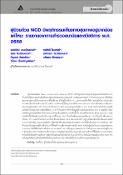How Many NCD Patients Have Risky Health Behaviors?: Report from Health and Welfare Survey
อมรรัตน์ มานะวัฒนวงศ์;
Amonrat Manawatthanawong;
สุรศักดิ์ ไชยสงค์;
Surasak Chaiyasong;
สุพล ลิมวัฒนานนท์;
Supon Limwattananon;
จุฬาภรณ์ ลิมวัฒนานนท์;
Chulaporn Limwattananon;
กัญจนา ติษยาธิคม;
Kanjana Tisayaticom;
วลัยพร พัชรนฤมล;
Walaiporn Patcharanarumol;
วิโรจน์ ตั้งเจริญเสถียร;
Viroj Tangcharoensathien;
Date:
2560-09
Abstract
 | ผลงานวิชาการเหล่านี้เป็นลิขสิทธิ์ของสถาบันวิจัยระบบสาธารณสุข หากมีการนำไปใช้อ้างอิง โปรดอ้างถึงสถาบันวิจัยระบบสาธารณสุข ในฐานะเจ้าของลิขสิทธิ์ตามพระราชบัญญัติสงวนลิขสิทธิ์สำหรับการนำงานวิจัยไปใช้ประโยชน์ในเชิงพาณิชย์ |
Fulltext
Total downloads:
| Today: | 0 |
| This month: | 39 |
| This budget year: | 39 |
| This year: | 643 |
| All: | 4,474 |
Collections
-
Articles [1378]
บทความวิชาการ

